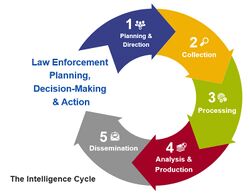Difference between revisions of "Intelligence cycle"
m (typo) |
|||
| Line 51: | Line 51: | ||
"The traditional Intelligence cycle is the fundamental cycle of intelligence processing in a civilian or military intelligence agency or in law enforcement as a closed path consisting of repeating nodes. The stages of the intelligence cycle include the issuance of requirements by decision makers, collection, processing, analysis, and publication of intelligence. The circuit is completed when decision makers provide feedback and revised requirements. The intelligence cycle is also called the Intelligence Process by the U.S. Department of Defense (DoD) and the uniformed services. The intelligence cycle is an effective way of processing information and turning it into relevant and actionable intelligence.<ref>https://en.wikipedia.org/wiki/Intelligence_cycle</ref>". | "The traditional Intelligence cycle is the fundamental cycle of intelligence processing in a civilian or military intelligence agency or in law enforcement as a closed path consisting of repeating nodes. The stages of the intelligence cycle include the issuance of requirements by decision makers, collection, processing, analysis, and publication of intelligence. The circuit is completed when decision makers provide feedback and revised requirements. The intelligence cycle is also called the Intelligence Process by the U.S. Department of Defense (DoD) and the uniformed services. The intelligence cycle is an effective way of processing information and turning it into relevant and actionable intelligence.<ref>https://en.wikipedia.org/wiki/Intelligence_cycle</ref>". | ||
| − | Wikipedia calls the [[9/11 Commission Report]] "a result of failures" in this cycle.<ref>https://en.wikipedia.org/wiki/Intelligence_cycle_management#Failures_in_the_intelligence_cycle</ref> | + | Wikipedia calls the [[9/11 Commission Report]] "a result of failures" in this cycle.<ref>https://en.wikipedia.org/wiki/Intelligence_cycle_management#Failures_in_the_intelligence_cycle</ref> |
| + | ===Origin=== | ||
| + | |||
| + | In the 1948 book, Intelligence Is For Commanders by LTC Phillip Davidson and LTC Robert Glass, the use of the word Intelligence Cycle is mentioned. | ||
===Concerns=== | ===Concerns=== | ||
| Line 59: | Line 62: | ||
===Planning=== | ===Planning=== | ||
| + | |||
| + | Planning is where policy makers, the Senate Committee for Intelligence, and the President and his aids ask for information to be looked into. | ||
===Collection=== | ===Collection=== | ||
| Line 68: | Line 73: | ||
===Dissemination=== | ===Dissemination=== | ||
| − | |||
| − | |||
==See Also== | ==See Also== | ||
Revision as of 16:06, 24 January 2022
(Military intelligence) | |
|---|---|
 | |
| How the intelligence community handles info. |
The Intelligence Cycle is a set of steps taken by military, law enforcement, and intelligence agencies by decision makers to get the right information to the consumer.
Contents
Official narrative
"The traditional Intelligence cycle is the fundamental cycle of intelligence processing in a civilian or military intelligence agency or in law enforcement as a closed path consisting of repeating nodes. The stages of the intelligence cycle include the issuance of requirements by decision makers, collection, processing, analysis, and publication of intelligence. The circuit is completed when decision makers provide feedback and revised requirements. The intelligence cycle is also called the Intelligence Process by the U.S. Department of Defense (DoD) and the uniformed services. The intelligence cycle is an effective way of processing information and turning it into relevant and actionable intelligence.[1]".
Wikipedia calls the 9/11 Commission Report "a result of failures" in this cycle.[2]
Origin
In the 1948 book, Intelligence Is For Commanders by LTC Phillip Davidson and LTC Robert Glass, the use of the word Intelligence Cycle is mentioned.
Concerns
Process
Planning
Planning is where policy makers, the Senate Committee for Intelligence, and the President and his aids ask for information to be looked into.
Collection
Processing
Analysis
Dissemination
See Also
A CIA document explaining kids how the cycle works: File:Briefing-intelligence-cycle.pdf
References
| This is a page stub. Please add to it. |